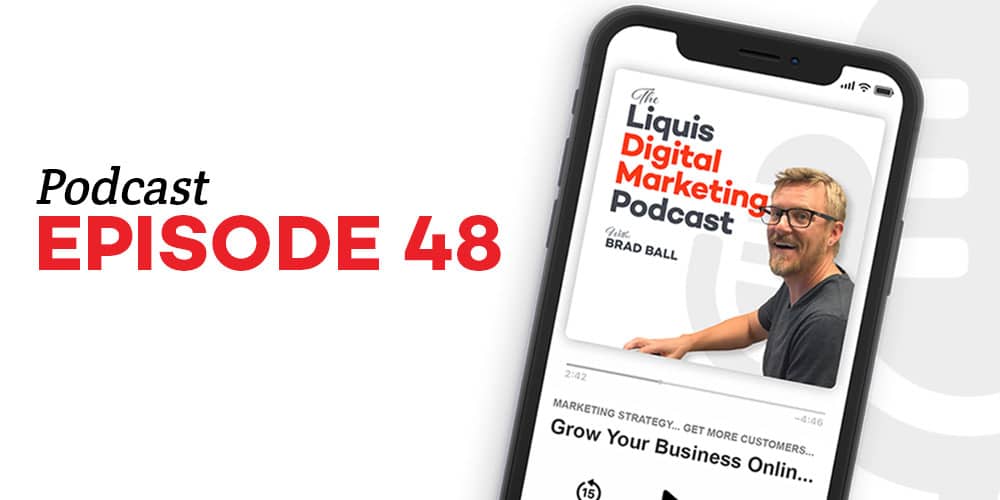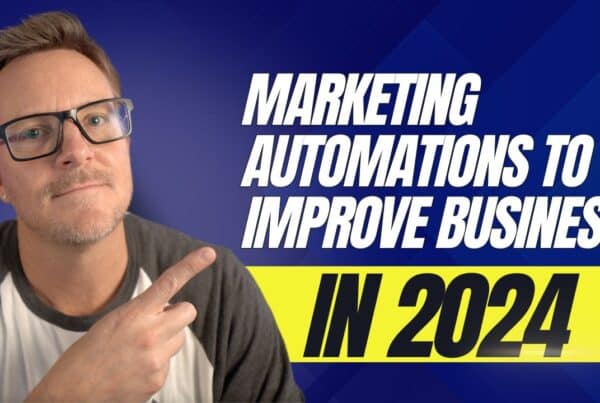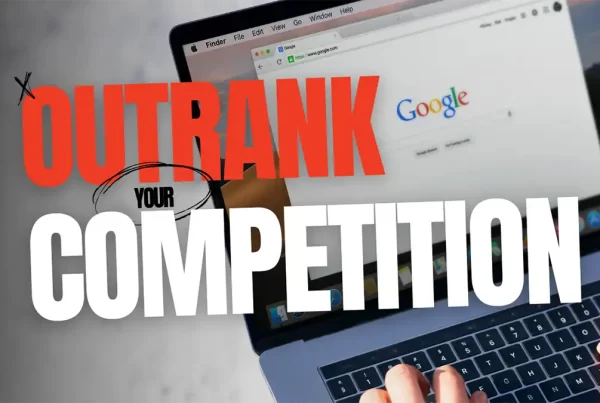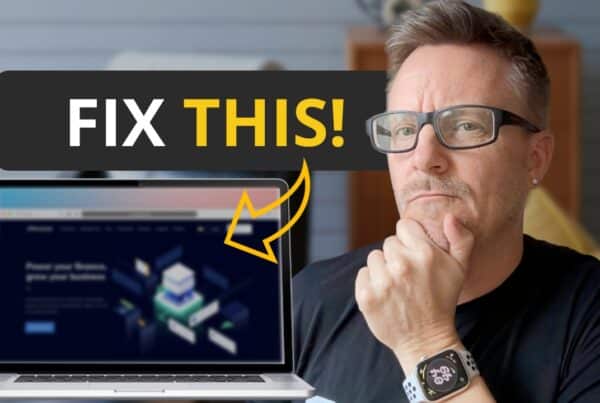Show Notes
Is your business showing up in local Google searches?
Nearly 50% of all Google searches include “local intent.” Meaning these people are looking for a local product or service.
But is YOUR business showing up in these results?
In this episode, we are talking about why Local SEO is critically important and what steps you can take to improve your Local SEO results today.
Discussion Topics:
- Local SEO vs Traditional Organic SEO
- Who needs Local SEO?
- Direct benefits to Local SEO
- Steps to improve your Local SEO
Resources:
SEMRush: https://semrush.sjv.io/DVkL4y
MOZ Local: https://moz.com/products/local
Google Business Profile: https://www.google.com/business/
Transcript
[00:00:00] Is your business showing up in local searches on Google, nearly 50% of all. Google searches include local intent. Meaning these people are looking for something local. The question is, is your business showing up? And these results. In this episode, we’re talking about why local SEO is so important in what steps you can take to improve your local SEO results.
[00:00:28] Welcome to the Liquis Digital Marketing Podcast, where each week we’ll be breaking down complex marketing topics into bite size steps you can take now to grow a profitable. For your business, we’ll discuss organic reach, offer optimization, paid advertising, email marketing, content creation, promotion techniques, and so much more.
[00:00:48] I’m your host, Brad Ball, founder of Liquis Digital, a marketing agency that has helped hundreds of clients of every shape and size reach their business goals since 2008. Thanks for joining us today and be sure to subscribe because you won’t wanna miss a beat. Now let’s grow.
[00:01:07] Hello. And welcome back to another episode of the Liquis digital marketing podcast. Today, we are talking about local SEO. So what is local SEO versus traditional organic SEO? Right. So by now you’ve heard of SEO search engine optimization, right? So it’s the act of. Taking some actions to improve your rankings in search results.
[00:01:31] So if someone’s searching for something it ranks in order of relevance to that search. So that’s SEO, right? Okay. So at local SEO versus traditional SEO, so traditional SEO is what you would typically think of when you search something and it gives you pages of pages of results for that search. So your main website pages.
[00:01:55] Your blogs. So all of these things that you are doing, that’s typically organic SEO. What makes local SEO different is it’s targeting local results. Meaning that if I’m in a certain area and I search for pizza restaurants, or, you know, some, a Mexican restaurant or something in my area, it’s gonna see, okay, you are here and I’m show you results in your location.
[00:02:26] So. That is a local search result. It’s gonna show me a result based off of my location, based off of what I’m searching for. That’s also includes maps. That includes when you search it, throws local results up at the top. So we’ll kind of get into that, but that’s really the difference, right? So, When we think of local SEO, we’re thinking about location.
[00:02:49] We’re thinking about, you know, trying to get into the maps, getting into the upper area on Google searches, where you see those local results. And that’s just the big difference between the two. You don’t have pages and pages of local results. It’s only gonna show you that top three, which will get to it’s called the three pack.
[00:03:07] So when you do a Google search, what you typically see in the results is first, you’ll see one to three ads. At the top. And then you’ll see a map with three locations, three results of based off of what you searched, that’s called the three pack. And that’s what you’re trying to get into nearly 50% of Google searches.
[00:03:30] Are local intent, meaning they’re looking for something in their area, those local results that they show that three pack is, has a trust factor of like 60% versus I’m kind of rounding here, a trust factor of like 30% for like organic results. Right? So those local results that you’re getting are highly and mostly clicked on.
[00:03:52] That’s usually what people click on for. First, especially if they’re doing a local search. So that’s the reason that you really wanna focus on local results. You’re actually gonna get so much more ROI on those local results than you would on regular organic searches. But let’s talk about who is this for?
[00:04:11] Right. Is this for everybody? Does that mean everybody should be focusing on local SEO? Well, not necessarily. So if you are one of these, this is really going to matter to you. So if you are a local company, right? So a restaurant, a barbershop, um, you have a brick and mortar of any type in multiple okay.
[00:04:29] Locations or a single location. If you are a small business, It matters if you let’s say service a specific area. So we service maybe all of the Phoenix area. So let’s say we’re a mover. And we, we service this Phoenix area. If you’re looking to drive more traffic in a specific market area. And also if you want your business to show up in maps, all of these factors are, are reasons why you would need and want to focus on local SEO.
[00:04:59] All right. So let’s go over some important stats. If I haven’t driven at home enough of how important this is. All right, so I’m gonna read some of these. So 46% of all searches on Google include local intent. I kind of mentioned that earlier 97% of users searched online to find a local business. So 90% of users search online to find local businesses, that’s nearly a hundred percent.
[00:05:24] So we’ve all done it. Everybody’s doing it right. it’s happening. The question is, are you showing up 78% of local searches on mobile results and offline purchases? So if someone’s searching for you and they see your local result in Google, 78% of those searches are resulting in a purchase. 70% of consumers will visit a store because of the information found online 25% of all clicks go to the first result of that local business search.
[00:06:00] Near me searches. So searching, you know, dentists near me grew by 136%. Last year, 62% of consumers will disregard a business if they can’t find ’em online. So if you can’t be found online, you are gonna get dis disregard 88% of potential customers. Look for online reviews before choosing local services.
[00:06:28] And then 86% of customers use Google maps to find a local business. I know I do. If I’m looking for a restaurant or I’m looking for their menu, or I want to find their number, and if I’m on my phone, I’ll open up my map and search the maps. Before I open up. Safari or the internet and search, you know, just the regular web, right.
[00:06:50] I go right to my maps. If I’m looking for something local and it gives you so much information. So yeah, local results, super, super important. If you’re a local business, it’s a make or break situation. Like you have to be focusing on this. If you do anything in 2022, focus on your local SEO, and I guarantee you by 2023, you’ll be happy.
[00:07:15] Okay. Direct benefits of focusing on your local SEO is one. You’re gonna show up in that three pack, which I’ve already explained, right? It’s that top three research results that you get at the top of your Google search, it’s gonna increase your online visibility and organic traffic. And it’s gonna help you outran your local competition.
[00:07:36] So if you are not showing up, they’re gonna show something and if it’s not you, it might be your competition. So it’s important that you get up there and it’s also gonna ensure that you’re findable in the maps. All right. So let’s talk about what can you do? What do you do next? How can you prove your local SEO?
[00:07:55] Well, there’s a handful of things and it does take time. Typically, give it about four months before you start seeing results. The SEO just takes time. So when you start doing these things, you’ll see some quick wins. You’ll see some immediate things, but really it, it takes a little bit, it takes a few months.
[00:08:12] And on average they say it takes about four months to start seeing some return on your local SEO initiatives. So first off, what you’re gonna do is you need to claim your business on Google business profile. If you start searching Google business profile, you’re gonna find a lot of different information where it’s called Google my business, because they just recently changed the name.
[00:08:33] And this is Google’s thing is they love, love, love, love to change the name of this service. It started off years ago as Google local, then it turned into Google. Plus when they tried to become a social platform. Then it turned into Google places. Then it turned into Google, my business, and now it’s Google business profile.
[00:08:55] So to be honest, it’s, it’s very much the same Google business profile is very much the same as Google my business. Um, there are some added features to which I’ll get into in a second here, but if you just go to Google business profile and find your business on there, You wanna make sure you claim it and there’ll, there’ll be a claim like a claim, this location option.
[00:09:14] So make sure you claim that it’ll give you some steps. It takes a little bit of time. I think what happens last time I had to do it. I think they actually will physically mail you a card with a code that you have to go in and validate and all this stuff so that they really wanna make sure which is good.
[00:09:28] They wanna make sure that you are. The business owner and you’re claiming this location and no one else can claim that location. Right. So that’s good. So claim your Google business profile. Once you do that, you wanna fill out as much as possible. You wanna upload images, you wanna upload videos, you wanna upload your logo, fill it out as much as you can.
[00:09:50] The more. Complete the better Google loves to see these profiles be complete and full of content. It shows them that you are an active business. It shows them that you are, you know, putting in and investing into their platform and giving the users as much information as you can. Cuz all they wanna do is provide as much value to the people searching for you.
[00:10:15] So if you are giving value to them, Then they will reward you with better results. So make sure you fill everything out. Also make sure that you put keywords in your profile. So as you’re like filling out who you are with your description and all that, try to put in keywords, but do it naturally. Don’t just keywords stuff.
[00:10:35] A bunch of keywords in there, you know, do it like as if someone was gonna actually read it so right. For a human, make sure you put your link to your website in there. And then with the new Google business profile, they’ve come out with a couple new features. One of ’em is it’s supposed to give you a call history, which I haven’t played around with yet.
[00:10:55] Also messaging is supposed to be integrated right into search and maps. So if you’re searching something in maps, you should be able to, if you have it set up message that business and have a messaging service right there. So they’re providing that for you, which is pretty cool. The next thing to think about when you are optimizing for your local SEO is the searchers location matters, right?
[00:11:20] So let’s say you have a dentist office and it’s called dentist near me. I saw this funny meme recently about that, and there’s this dentist that named themselves dentist near me and their URL’s dentist near me. And, and everything’s dentists near me and optimizing for that now in the organic surgery results that they’re probably maybe winning on that one, but in local, That’s not a win because Google is smart enough to know the person’s location.
[00:11:45] So if, if I’m in Arizona and I’m searching a dentist near me, and this dental office is in Florida, that has optimized their local search results for dentist near me. Well, I’m not near them. And Google is smart enough to know that. So your search location matters. If I’m in one area of a state. I’m not gonna see results for another area in the state.
[00:12:08] I’m gonna see stuff that is immediately around me. If you are testing your search results and you’re not seeing yourself, well, make sure you are in the area of your business, where you’ve optimized for, because your location will matter. The next thing you can do is. Nap citations. Nap stands for name, address, and phone.
[00:12:28] So this is your business name, your business address, and your business phone citations are basically entries into online directories, let’s say, right? So Yelp and like for on our industry, we have like, Up city. And, but there’s directories right. In every industry there’s directories. And then there’s just local search directories, like four square and, and Yext and Yelp.
[00:12:53] And I mean, there’s a bazillion of ’em right? Even your social platforms, like your Twitter’s and your Facebooks and where you can put in your business name and your business address and all of this stuff. So here’s the kicker with that. What typically happens is people aren’t consistent with this information.
[00:13:09] What does happen is the internet is gonna go try to pull all of this information. So the most likely what will happen is these directories are gonna go like crawl the internet and pull what information they can. And a lot of times it doesn’t pull the correct information. So maybe the phone number’s wrong or the address is wrong.
[00:13:26] You didn’t add it. They just pulled it. And the they’re having it out there as your information and incorrect information. What Google’s doing is it’s, it’s trying to gather as much information as it can about your business. And so it’s gonna go to all of these directories and it’s gonna see all of this content or all of this information and what it wants to see is it all be the same.
[00:13:50] Make it easy for Google to say, okay, this is their phone number, not, well, I don’t know. I have this number over here and this number over here and this number over here, or they’re at this address here and it’s spelled a little differently here and oh, this one has their suite number, but this one, this suite number’s different.
[00:14:05] Right? Like it’s different in every spot. Then now Google. Doesn’t exactly know which one to use. So keeping them all consistent and making sure all of these citations are out there correctly. And you’re adding new ones. This tells Google that you’re an active business. It tells Google the correct information and is going to reward you with better local.
[00:14:28] Results. So this is very daunting task to do manually very, very daunting task. I highly recommend using one of two tools. One is Moss local. Uh, one’s a little bit more inexpensive than the other one. I’m about to tell you. And it’s, it’s a great tool. I actually use it and it’s worked well. So if you wanna start there, maybe start there.
[00:14:47] Another one is SM rush and I have not used this one yet, but SEM rush. Is kind of the leader in these tools and it’s a little bit more expensive. You might get some better results. Their interface looks pretty cool and they have some cool tools. I would actually recommend checking them out. And if it’s in your budget, I would actually recommend SCM rush.
[00:15:07] Think they’re going to give you, uh, some better results and some more tools, but miles local is good too. And in fact, I stand by them. We use them. So nap, citations. All right. The other thing is online reviews. So these are a super important thing to tell Google how well your business is, right. It’s kind of like the heartbeat of your business.
[00:15:27] So it’s gonna look at two things. One is how many reviews and two, what is the overall sentiment of these reviews? So if you have a lot of bad reviews, it’s gonna take that into account. If you have one bad review, it doesn’t necessarily mean that you’re done. It just means, you know, you wanna respond to that.
[00:15:44] You want to really try to drive good reviews. We use this tactic in our business where we will send out to a customer at the right time, a review ask, you know, say how we don’t just say here, go leave us review. We ask, know how was your service and give ’em two options. It was good or needs improvement, whatever, if it needs improvement.
[00:16:04] Then it gives, ’em an opportunity to take ’em right to a form where they fill out and give us some feedback. If it’s they select good, then it gives ’em the opportunity to go right to where they can leave us a review. So it kind of like fields those reviews and drives good online reviews. Okay. So the next tip is to create a location specific page on your website.
[00:16:27] You definitely wanna make sure that you have your name, address, and phone number on your website. Right? I would recommend putting it in the footer that way it’s on every page. Super important. But what you can do. Let’s say you have a service in an area I’m gonna take us. For example, let’s say we have, uh, custom web design in Phoenix, Arizona.
[00:16:44] We could create a landing page just for that, where the, all of the SEO stuff is geared toward this keyword phrase and our local search results. So we could have that in the URL. We can have that in the, what they call the H one tag, that’s the heading tag in your page. So you should only have one heading tag, have that keyword in that heading tag, and then have related keywords in H two and H three tags down lower in the page.
[00:17:12] As you create content for this page, it should be written for human. Not for robots. People should be able to read it, but you want to try to integrate your keywords in there, such as, you know, web design in Phoenix, custom web designers, uh, whatever. Right. So you got to integrate your keywords inside of this page.
[00:17:29] Naturally, obviously, like I said, you wanna have your nap, your name, address, phone number, and you wanna embed a Google map into this page and take it one step further. If you can create a video and upload it to YouTube when you upload it, make sure you have the videos and the name, the file name of your video.
[00:17:48] Make sure you have your keyword phrase and the title will have the keyword phrase of this video. Then take that video and embed it on this page that is going to really, really help you with your local search results. One other tip is with your images that you upload to this page. You can actually go to a website called I think it’s geo code.
[00:18:10] And you can put in your location of this image and give it a title in your alt tags put in the keyword phrase. So that way it’s, you’re kind of geotagging these images. So even the images are a location, so it tells Google what this pages and where this page is located. So there you have it, there are other things to do to increase your local SEO results.
[00:18:34] I highly recommend if you are a local business or a small business of any kind that you really, really focus on this, you’re gonna probably get way more return on your investment with local SEO versus organic SEO. Now I’m not saying ignore organic, but I would really, really focus on the local SEO and it’s worth paying a little money to get some results in this.
[00:18:58] So using the tools or using some company that can help you with this. If you found this valuable, please leave us a review. Uh, we’d love to hear your feedback and don’t forget to like share and subscribe. We’ll see you in the next episode. Thanks for listening in today. I hope you enjoyed the show and Hey, if you did, please take a second to leave a review and share this episode with someone who you think might also benefit from it.
[00:19:23] I appreciate you so much. And as always, we’re here to help. If you have any questions about this episode, or want to talk strategy with us about your own project, just shoot us an email to info at Liquis Digital dot and we’ll catch you in the next episode.




